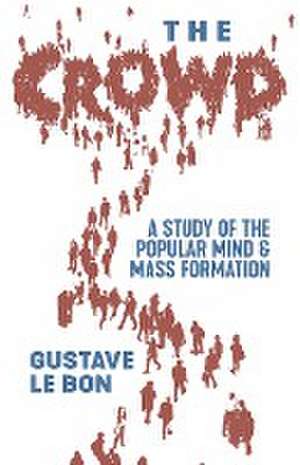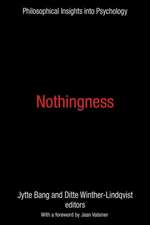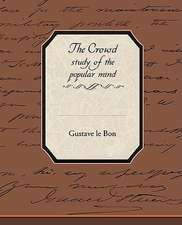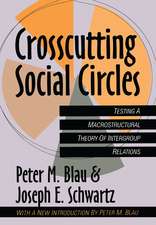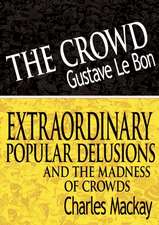The Crowd
Autor Gustave Le Bonen Limba Engleză Paperback – 20 oct 2022
| Toate formatele și edițiile | Preț | Express |
|---|---|---|
| Paperback (10) | 41.93 lei 3-5 săpt. | |
| CREATESPACE – | 41.93 lei 3-5 săpt. | |
| CreateSpace Independent Publishing Platform – | 51.31 lei 3-5 săpt. | |
| CREATESPACE – | 103.14 lei 3-5 săpt. | |
| Bottom of the Hill Publishing – 31 dec 2014 | 104.91 lei 3-5 săpt. | |
| Taylor & Francis – 31 mar 1995 | 363.37 lei 3-5 săpt. | +19.55 lei 7-13 zile |
| Digireads.com – 18 dec 2019 | 59.99 lei 6-8 săpt. | |
| AZILOTH BOOKS – 30 oct 2017 | 62.49 lei 6-8 săpt. | |
| Blurb – 2 feb 2019 | 66.39 lei 38-44 zile | |
| FV éditions – 3 iun 2020 | 67.84 lei 6-8 săpt. | |
| Greenpoint Books, LLC – 20 oct 2022 | 85.30 lei 6-8 săpt. | |
| Hardback (4) | 110.18 lei 6-8 săpt. | |
| FV éditions – 4 iun 2020 | 110.18 lei 6-8 săpt. | |
| Binker North – 23 apr 2020 | 152.65 lei 6-8 săpt. | |
| Exciting Classics – 27 iun 2016 | 174.44 lei 38-44 zile | |
| Taylor & Francis – 20 sep 2017 | 1001.55 lei 6-8 săpt. |
Preț: 85.30 lei
Nou
Puncte Express: 128
Preț estimativ în valută:
16.32€ • 17.08$ • 13.56£
16.32€ • 17.08$ • 13.56£
Carte tipărită la comandă
Livrare economică 02-16 aprilie
Preluare comenzi: 021 569.72.76
Specificații
ISBN-13: 9798886770155
Pagini: 158
Dimensiuni: 140 x 216 x 9 mm
Greutate: 0.21 kg
Editura: Greenpoint Books, LLC
Pagini: 158
Dimensiuni: 140 x 216 x 9 mm
Greutate: 0.21 kg
Editura: Greenpoint Books, LLC
Notă biografică
Charles-Marie Gustave Le Bon ( 7 May 1841 - 13 December 1931) was a leading French polymath whose areas of interest included anthropology, psychology, sociology, medicine, invention, and physics. He is best known for his 1895 work The Crowd: A Study of the Popular Mind, which is considered one of the seminal works of crowd psychology. A native of Nogent-le-Rotrou, Le Bon qualified as a doctor of medicine at the University of Paris in 1866. He opted against the formal practice of medicine as a physician, instead beginning his writing career the same year of his graduation. He published a number of medical articles and books before joining the French Army after the outbreak of the Franco-Prussian War. Defeat in the war coupled with being a first-hand witness to the Paris Commune of 1871 strongly shaped Le Bon's worldview. He then travelled widely, touring Europe, Asia and North Africa. He analysed the peoples and the civilisations he encountered under the umbrella of the nascent field of anthropology, developing an essentialist view of humanity, and invented a portable cephalometer during his travels. In the 1890s, he turned to psychology and sociology, in which fields he released his most successful works. Le Bon developed the view that crowds are not the sum of their individual parts, proposing that within crowds there forms a new psychological entity, the characteristics of which are determined by the "racial unconscious" of the crowd. At the same time he created his psychological and sociological theories, he performed experiments in physics and published popular books on the subject, anticipating the mass-energy equivalence and prophesising the Atomic Age. Le Bon maintained his eclectic interests up until his death in 1931. Ignored or maligned by sections of the French academic and scientific establishment during his life due to his politically conservative and reactionary views, Le Bon was critical of democracy and socialism. Le Bon's works were influential to such disparate figures as Theodore Roosevelt and Benito Mussolini, Sigmund Freud and José Ortega y Gasset, Adolf Hitler and Vladimir Lenin.
Cuprins
Introduction to The Transaction Edition; Author’s Preface; Introduction; Book I: The Mind of Crowds; I: General Characteristics of Crowds—Psychological Law of Their Mental Unity; II: The Sentiments and Morality of Crowds; III: The Ideas, Reasoning Power, and Imagination of Crowds; IV: A Religious Shape Assumed by All The Convictions of Crowds; Book II: The Opinions and Beliefs of Crowds; I: Remote Factors of The Opinions and Beliefs of Crowds; II: The Immediate Factors of The Opinions of Crowds; III: The Leaders of Crowds and Their Means of Persuasion; IV: Limitations of The Variability of The Beliefs and Opinions of Crowds; Book III: The Classification and Description of the Different Kinds of Crowds; I: The Classification of Crowds; II: Crowds Termed Criminal Crowds; III: Criminal Juries; IV: Electoral Crowds; V: Parliamentary Assemblies
Descriere
Descriere de la o altă ediție sau format:
Gustav Le Bon's The Crowd is not only a classic, but one of the best-selling scientific books in social psychology and collective behavior ever written
Gustav Le Bon's The Crowd is not only a classic, but one of the best-selling scientific books in social psychology and collective behavior ever written
